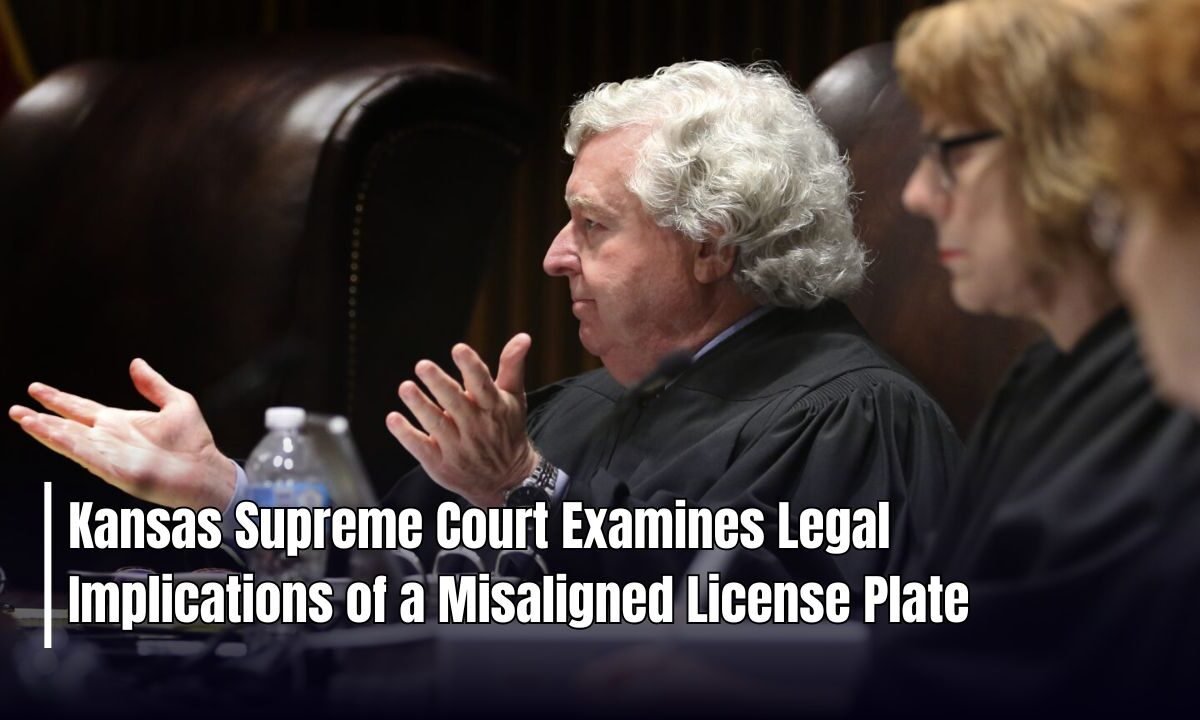In the early hours of August 25, 2021, a routine traffic stop in Jackson County, Kansas, triggered by a visibly loose license plate on a vehicle, evolved into a landmark ruling by the Kansas Supreme Court.
Passenger Tashara Yeargin‑Charles challenged the ensuing search and seizure, yet the court’s decision not only affirmed her convictions but also delivered important guidance on roadside stops under Kansas law.
Background of the Stop
At approximately 3:30 a.m., county officers observed Yeargin-Charles’s vehicle travelling on U.S. Route 75 with a rear license plate that sagged on the right side.
Deputy Justin Dobler and Sergeant Travis DeBarge noted that the plate appeared to be loosely attached and “flapping in the wind.”
Based on that observation, officers initiated a stop to investigate a suspected violation of state law governing vehicle license-plates.
Charges Against Yeargin-Charles
During the stop and subsequent search, law enforcement discovered:
- An open container of alcohol inside the vehicle.
- In Yeargin-Charles’s purse: a bottle of peach-flavored vodka, a marijuana joint, and a pipe with burnt methamphetamine residue.
- Following the search, Yeargin-Charles collapsed, claimed she was about to give birth, said she had COVID-19 and identified as a paranoid schizophrenic. A hospital exam confirmed she was not pregnant.
She was charged and ultimately convicted of:
- Possession of methamphetamine, marijuana, and drug paraphernalia
- Interference with law enforcement
- Transportation of an open liquor container
Kansas Supreme Court Ruling
Writing for the majority, Justice Melissa Standridge upheld the convictions. The court found that under Kansas statute (K.S.A. 8-133(c)), a license plate must be “securely fastened … at least 12 inches from the ground” and “legible and visible.”
The loose, tilted plate created reasonable suspicion for the stop. The evidence sufficiently supported the district court’s factual findings that Deputy Dobler had grounds to initiate the stop.
Dissenting Opinion
Justice Caleb Stegall, joined by Justices Eric Rosen and K.J. Wall, disagreed. They argued the majority’s interpretation deviated from a strict textual reading of the statute—specifically, that the law prohibits only a plate “swinging,” not merely “flapping.”
The dissent emphasized that the officers testified the plate was flapping, not swinging, and maintained that the court should adhere to precise statutory language rather than broader reasonableness standards.
Implications for Reasonable Suspicion & Traffic Stops
This ruling underscores that traffic stops under both the U.S. Fourth Amendment and the Kansas Bill of Rights are permissible when officers observe facts that give rise to reasonable suspicion of a statute violation.
Even if the interpretation of the statute is contested, the focus lies on whether the officer’s belief was reasonable, not flawless statutory parsing. The majority’s decision signals that deviations from statutory standards—even if subtle—can justify stops when visible and objectively discernible.
The Yeargin-Charles case represents more than a routine traffic stop. It illustrates how a seemingly minor vehicle defect—a loosely attached and tilted license plate—can trigger constitutional questions about search and seizure.
The Kansas Supreme Court’s ruling reaffirms that law enforcement’s reasonable observations of statutory violations can form a lawful basis for stops, even as the boundaries of statutory interpretation remain contested.
For drivers, this decision serves as a caution: maintaining proper plate installation is not just mechanical compliance—it may affect your constitutional protections.




